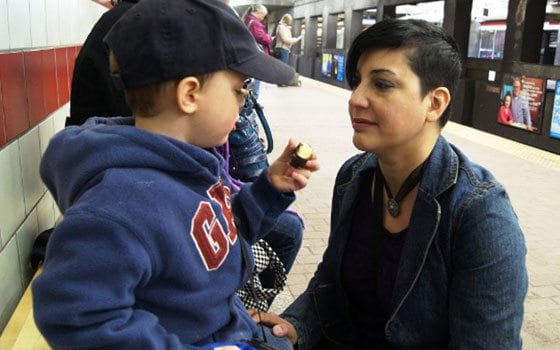
Hand in hand, Norma Fajardo, 40, of South Boston and her 3-year-old son walk half a mile to the Andrew MBTA station in Dorchester.
They commute 40 minutes or more each way from their home in the Old Colony Housing Development to her job and nearby day-care center in Davis Square in Cambridge.
They stomp on grates to hear them echo, wave to passing buses and count stairs in Spanish to make the journey fun.
“I haven’t had a car for the past 15 years,” Fajardo said, “But I probably should have one, with him.” Fajardo’s budget only allows $7 in spending money per month; a car is an unlikely purchase in the near-future.
At a time when unemployment rates are in the double digits and the U.S. is suffering through the “Great Recession,” people are struggling more than ever to make ends-meet.
A recent study published by the Crittenton Women’s Union (CWU) found that for a single-adult to be self-sufficient in Massachusetts, they must earn more than double the state’s current $8 per-hour minimum-wage.
In Fajardo’s case, a single mother with a pre-schooler, the needs are much greater. According to the Massachusetts Economic Independence Index 2010 (Mass Index), she must earn $49,037 per-year, almost three-times the minimum-wage — and that’s just to cover the basics.
Fajardo’s job as a medical biller for Little Sisters of the Poor in Somerville pays a little more than half that figure.
Though she must rely on government housing and day-care assistance, she said finds inspiration in her son to keep moving forward.
“I do it all for him,” she explains. “I honestly wish there was at least two more hours in the day, so I can get more done and at least spend more time with him. I know it’s going to get better for us. I keep working hard for him to get us out of here, because this is not where we want to live.”
Because she qualifies for day-care assistance, at $793 per-month, housing is Fajardo’s greatest expense. But for many other working-parents, child care is a major expense. According to the Mass Index the average single-parent pays a minimum of $900 per-month for child-care for one child.
The Mass Index accounts for basic living expenses, including housing, child-care, taxes and other essential items with no allowance for savings.
CWU publishes the Mass Index every three years as a tool to guide low-income residents across the state toward economic independence.
The first report was released in 1998, and since then, the costs of living have increased by almost 50 percent for a single-parent family with one preschooler and one school-age child.
“At the same time these costs have gone up, we have seen a drastic change in the ability to earn that kind of income happen in the Commonwealth,” CWU’s President and CEO Elisabeth D. Babcock said at a press conference to release the latest study.
“We have seen for a single mother with two children, three years ago her average take-home pay was $33,000 a year. Now her average take-home pay is $29,000 and change per-year. We have seen an erosion in those earnings.”
Nezra Sandy also feels the strains of balancing family and a future with below Mass Index wages.
Sandy earns $32,000 per-year working the night-shift at a nursing rehab facility. During the day, she attends Bunker Hill Community College.
Her husband supplements their income with temporary construction jobs. But that’s when he can get work.
“We moved here to Boston because there were more construction jobs available, but it has been a struggle,” she said.
Four years ago, when they arrived in Boston from Pennsylvania, Sandy earned a little more than a minimum-wage. But with a newborn daughter, their expenses were so beyond their wages that they relied on food stamps to stay afloat.
“At that time in Boston,” she said, “a family who has two adults and an infant needed an annual income of $51,000 — my husband and I are not even close to that.”
And options are few.
“In the recession the jobs that we lost have been at the bottom end of the scale and the jobs we have kept have been at the top end of the scale,” Babcock said. “And so what this says is that people who need to be economically independent are not able to get the jobs they need to support their family.”
Michelle Feliz, 34, a single mother of a 13-year-old daughter and six-month-old son, works as an administrative assistant at the University of Massachusetts and earns $35,000 per-year.
That is just over half of the $62,421 per-year income needed to support her family in Boston according to the Mass Index.
With information and guidance from CWU, she created a five-year plan filled with large and small goals. While she has short term goals of earning a certificate to teach Sunday-school, or long term goals such as graduating from UMass with a bachelor’s degree in human services, her ultimate goal is to become economically independent and for the first time in 14 years, live outside of public housing.
“It should take me four years [for my educational goals] and then my financial goals should be five,” Feliz explained.
She said she is hopeful that she will be able be self-sufficient by 2015, working toward purchasing a home. “That’s what the plan is!” she said.






